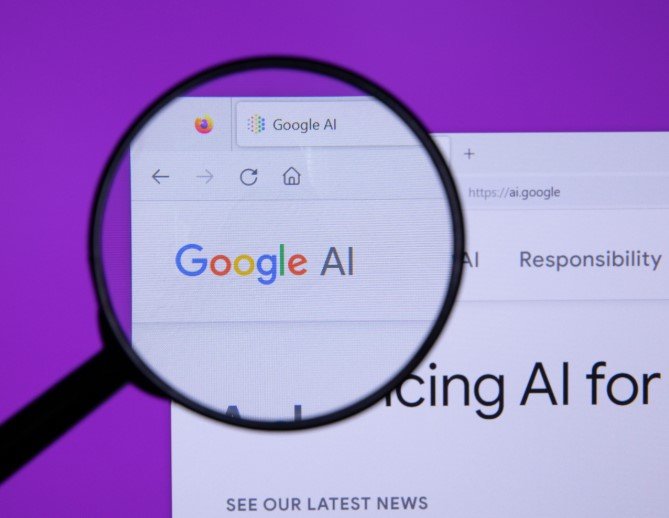Google has begun testing an AI-powered search feature on its homepage, marking a bold move to compete with the likes of ChatGPT in the rapidly growing world of generative AI.
The new “AI Mode” is positioned directly beneath the Google search bar, sitting next to the traditional “Google Search” button. This new addition replaces the iconic “I’m Feeling Lucky” button, which has been a staple of the search engine for years. Though still in the testing phase and not widely available, the feature is a clear signal of Google’s growing interest in integrating artificial intelligence directly into its search engine.
AI Mode: Google’s Bold Move to Compete with ChatGPT
For years, Google’s homepage has been almost untouched, with the only significant changes being occasional updates to the layout and features. This new AI Mode could represent a shift in how Google is approaching the future of its search engine. For many, Google Search is synonymous with its simplicity—just a search bar and a button. The addition of this AI-driven mode aims to tap into the growing demand for smarter, more interactive search results.

A company spokesperson confirmed that the feature began rolling out to some users over the past week. However, it’s important to note that this is part of Google’s ongoing experiments within its “Labs” unit, a program dedicated to testing new ideas with a limited group of users. These tests are meant to help the company gauge user reaction and refine the product before deciding whether to launch it to the broader public.
As generative AI technology, such as OpenAI’s ChatGPT, continues to grow in popularity, Google’s move seems to be an attempt to bolster its position in the AI race. With ChatGPT becoming a go-to platform for many people looking for more conversational search experiences, Google may be hoping that this new feature can offer a similar functionality, directly in its search engine.
AI Mode: A Subtle but Powerful Change to the Homepage
The location of the new AI Mode button on Google’s homepage is particularly noteworthy. Historically, Google has been cautious about making changes to its search page layout, with the “I’m Feeling Lucky” button being one of the few elements that have stuck around for years. Replacing this long-standing feature with a more advanced AI option is a clear sign that Google is ready to explore new possibilities.
The move also places artificial intelligence at the forefront of the user experience. While Google Search will still function in its usual way for users who don’t opt into the AI Mode, those who do will likely experience a new type of search altogether—one that could potentially understand queries more deeply and offer smarter, context-aware responses.
In addition to AI Mode, Google has been working on other AI-driven projects, such as its Gemini 2.0 model, which is designed to power more advanced conversational capabilities. These AI-powered systems could offer Google a way to deliver personalized, nuanced responses to queries, making it a stronger competitor against other AI-powered search tools.
Will AI Mode Take Off with Users?
It’s too early to say how widely adopted AI Mode will be. Google tests many features through its “Labs” unit, and not all of them make it to a broader launch. However, given the company’s investment in AI and the growing competition in the generative AI space, there’s a good chance that this feature could eventually become a mainstay.
If successful, AI Mode could redefine what we think of as a traditional search engine. Imagine asking Google not just for a list of links but for an in-depth, conversation-like response. The potential for such technology is enormous, with applications ranging from answering questions more efficiently to providing users with tailored, insightful content recommendations.
As AI continues to evolve, the line between traditional search and AI-driven search could blur, and Google’s role in that transformation could become even more significant.








